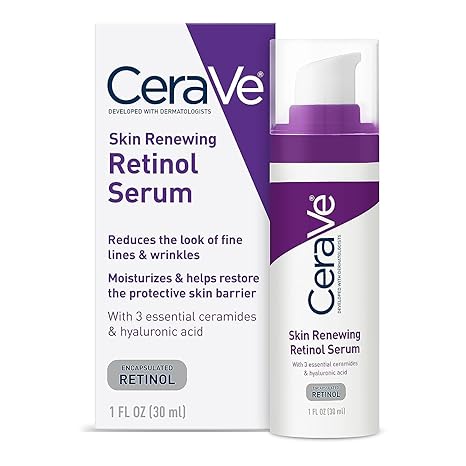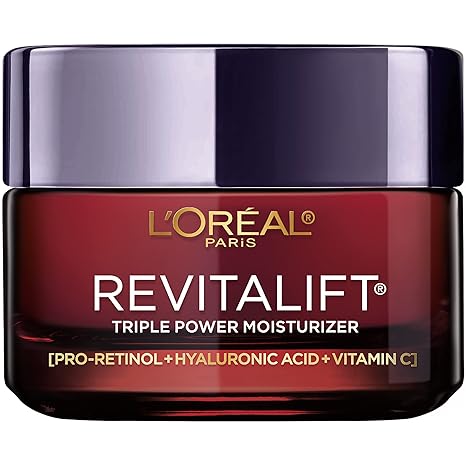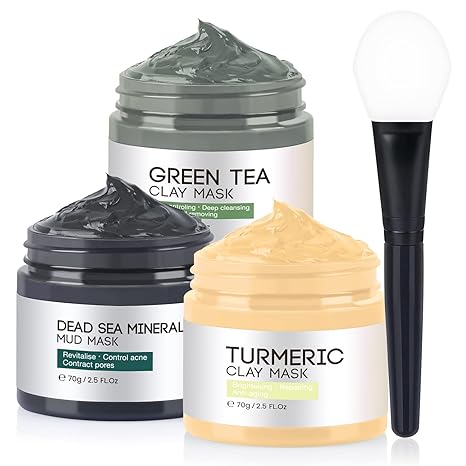As individuals enter their 60s, the significance of proper skincare becomes increasingly pivotal. This phase of life often brings about notable changes in the skin’s composition and structure, necessitating a more deliberate and specialized approach to skincare. In this introductory section, we will explore the fundamental importance of adopting a comprehensive skincare routine during one’s 60s. Additionally, we will delve into the critical significance of selecting anti-aging products that are not only effective but tailored to address the specific needs of mature skin. Understanding the unique challenges and characteristics of skin in this age bracket lays the foundation for informed choices in the realm of skincare.
| Product | CeraVe Anti Aging Retinol Serum | L’Oreal Paris Revitalift Triple Power Anti-Aging Face Moisturizer | IIIMEIDU Face Masks Skincare |
| Description | CeraVe Retinol Serum is a skincare product that tackles fine lines, wrinkles, and uneven skin tone. It harnesses the power of retinol, a form of vitamin A with anti-aging properties, and includes ceramides to restore and maintain the skin’s natural barrier. | The L’Oreal Paris Revitalift Triple Power Anti-Aging Moisturizer targets signs of aging, like wrinkles and loss of firmness, with hyaluronic acid for hydration and Pro-Retinol for anti-aging benefits. | IIIMEIDU Skincare Turmeric & Vitamin C Brightening Cleanser cleanses and brightens the skin with turmeric and vitamin C, renowned for their antioxidants and potential to enhance radiance. |
| Rating | 4/5 | 5/5 | 4/5 |
Table of Contents:
Characteristics of Skin in Your 60s
Entering the sixth decade of life brings about distinct changes in the skin, necessitating a targeted skincare approach. Understanding these characteristics is crucial for tailoring an effective anti-aging routine:
Decreased Elasticity and Firmness
One of the primary features of skin in your 60s is a noticeable decline in elasticity and firmness. The skin tends to lose its ability to bounce back and may appear saggy or less taut. This change is attributed to the reduced production of collagen and elastin, essential proteins for maintaining skin structure.
Emergence of Wrinkles and Fine Lines
The 60s mark a stage where wrinkles and fine lines become more pronounced. Expression lines deepen, and the skin’s natural ability to repair itself diminishes, leading to the formation of more visible signs of aging. Addressing these specific concerns becomes paramount in an effective anti-aging skincare routine.
Dullness and Loss of Skin Tone
Dull and uneven skin tone is another characteristic commonly observed in individuals in their 60s. Factors such as slower cell turnover and accumulated sun damage contribute to the loss of radiance. Combatting dullness requires products that promote cell renewal and target hyperpigmentation, revitalizing the skin’s overall appearance.
Understanding these key characteristics provides the foundation for selecting skincare products that address the specific needs of aging skin in the 60s, promoting a more vibrant and youthful complexion.
Key Ingredients in Anti-Aging Products
In the quest for effective anti-aging skincare, understanding the role of key ingredients is pivotal. These ingredients have proven efficacy in addressing the unique needs of mature skin:
Retinol
Retinol, a derivative of vitamin A, is renowned for its ability to stimulate collagen production and promote cell turnover. It aids in reducing the appearance of fine lines, wrinkles, and age spots. Incorporating retinol into an anti-aging regimen can contribute significantly to smoother and more youthful-looking skin.
Hyaluronic Acid
Hyaluronic acid is a hydration powerhouse. In the 60s, skin tends to lose moisture, leading to dryness and accentuating the appearance of wrinkles. Hyaluronic acid attracts and retains water, providing intense hydration and plumping the skin. This ingredient contributes to a more supple and resilient complexion.
Peptides
Peptides are amino acid compounds that play a crucial role in collagen synthesis. Including peptides in anti-aging products can help improve skin firmness and elasticity. These ingredients work to diminish the visibility of fine lines and wrinkles, promoting a smoother and more lifted skin appearance.
Vitamin C
Vitamin C is celebrated for its antioxidant properties, which help protect the skin from free radical damage caused by environmental factors like UV radiation. Additionally, vitamin C brightens the complexion, reduces hyperpigmentation, and supports collagen production, enhancing the skin’s overall texture and radiance.
Niacinamide
Niacinamide, or vitamin B3, offers a range of benefits for aging skin. It helps improve the skin’s barrier function, reducing moisture loss and enhancing its ability to retain hydration. Niacinamide also addresses uneven skin tone, making it an effective ingredient for combatting discoloration and promoting a more even complexion.
Incorporating products with these key ingredients into an anti-aging skincare routine can provide comprehensive care, targeting various aspects of skin aging and contributing to a more revitalized and youthful appearance.
Best anti aging skin products for 60s
When it comes to the best anti-aging products for individuals in their 60s, various formulations cater to specific needs. Here’s a breakdown of top-rated products across different categories:
Serums
CeraVe Anti Aging Retinol Serum

CeraVe Retinol Serum is a skincare product designed to address issues like fine lines, wrinkles, and uneven skin tone. It contains retinol, a form of vitamin A known for its anti-aging properties, along with ceramides to help restore and maintain the skin’s natural barrier.
Key Features:
- Retinol Formula: Incorporates retinol to target signs of aging and promote smoother skin.
- Ceramides: Includes ceramides to strengthen the skin barrier, providing hydration and protection.
- Non-Comedogenic: Formulated to avoid clogging pores, making it suitable for various skin types.
- Fragrance-Free: Ideal for those with sensitivity to fragrances in skincare products.
- Gentle and Effective: Intended for daily use, providing gradual improvements without irritation.
Considerations:
- Sun Protection: When using retinol, it’s crucial to use sun protection as the skin may become more sensitive to sunlight.
- Individual Sensitivity: Some individuals may experience mild irritation or dryness when introducing retinol into their skincare routine.
Before purchasing, it’s advisable to check customer reviews and consider your own skin type and concerns. If you have specific skincare needs or concerns, consulting with a dermatologist can provide personalized guidance.
Face Creams
L’Oreal Paris Revitalift Triple Power Anti-Aging Face Moisturizer

The L’Oreal Paris Revitalift Triple Power Anti-Aging Moisturizer is formulated to address signs of aging, such as wrinkles and loss of firmness. It features hyaluronic acid for hydration and Pro-Retinol for anti-aging benefits.
Key Features:
- Hyaluronic Acid: Provides intense hydration, helping to plump and moisturize the skin.
- Pro-Retinol: A derivative of vitamin A known for its anti-aging properties, targeting fine lines and wrinkles.
- Triple Action Formula: Aims to address wrinkles, firmness, and uneven skin tone for comprehensive anti-aging benefits.
- Non-Greasy: Designed to be absorbed easily without leaving a greasy residue on the skin.
- Day and Night Use: Suitable for both morning and evening application as part of a daily skincare routine.
Considerations:
- Individual Skin Sensitivity: As with any skincare product, individual reactions may vary, and it’s advisable to perform a patch test.
- Sun Protection: For optimal anti-aging results, use in conjunction with a sunscreen during the day.
Before making a purchase, reading customer reviews and considering your specific skin concerns can be helpful. Additionally, if you have specific skincare needs or concerns, consulting with a dermatologist is recommended for personalized advice.
Masks and Patches
IIIMEIDU Face Masks Skincare

IIIMEIDU Skincare Turmeric & Vitamin C Brightening Cleanser is a skincare product designed to cleanse and brighten the skin. It features turmeric and vitamin C, known for their antioxidant properties and potential benefits for achieving a more radiant complexion.
Key Features:
- Turmeric: Contains turmeric, recognized for its anti-inflammatory and antioxidant properties.
- Vitamin C: Enriched with vitamin C, which may help brighten the skin and even out the complexion.
- Cleansing Properties: Intended to cleanse the skin, removing impurities and excess oil.
- Brightening Effect: Aims to promote a brighter and more radiant skin tone.
- Suitable for All Skin Types: Formulated to be suitable for various skin types.
Considerations:
- Individual Sensitivity: As with any skincare product, individual reactions may vary, so it’s advisable to perform a patch test.
- Cleanser Usage: Assess whether the product aligns with your specific cleansing preferences and skincare routine.
Before purchasing, reading customer reviews and considering your specific skin concerns can provide additional insights. If you have particular skincare needs or concerns, consulting with a dermatologist is recommended for personalized advice.
Choosing from these top-rated anti-aging products allows individuals in their 60s to tailor their skincare routine to address specific concerns, ensuring a comprehensive and effective approach to mature skin care.
Personalized Skincare
In the pursuit of effective anti-aging skincare for individuals in their 60s, a personalized approach is key to addressing specific needs and concerns. Here’s how to curate a skincare routine tailored to individual requirements:
How to Choose Suitable Products for Specific Needs
- Identify Your Skin Concerns: Assess your skin’s condition and identify specific concerns such as wrinkles, dryness, or uneven skin tone.
- Read Ingredient Labels: Familiarize yourself with key ingredients like retinol, hyaluronic acid, peptides, and vitamin C. Choose products that align with your targeted concerns.
- Consider Product Formulations: Opt for formulations that suit your skin type. For example, those with dry skin may benefit from richer creams, while individuals with oily skin may prefer lightweight serums.
- Patch Test New Products: Before fully incorporating a new product into your routine, perform a patch test to ensure compatibility and prevent potential adverse reactions.
- Address Multiple Concerns: If you have multiple skin concerns, consider a multi-step routine with targeted products for each issue.
- Observe Sensitivity: Pay attention to any signs of sensitivity or irritation. If a product causes discomfort, discontinue use and seek alternatives.
Consultation with a Dermatologist and Adjusting Skincare Routine
- Schedule Regular Dermatologist Visits: A dermatologist can provide valuable insights into your skin’s specific needs and recommend products based on your individual concerns. Schedule regular check-ups to monitor changes in your skin and adjust your routine accordingly.
- Seek Professional Advice for Persistent Issues: If you encounter persistent issues or severe concerns, consult with a dermatologist for personalized recommendations. They can prescribe medications or treatments tailored to your skin’s unique requirements.
- Adjust Routine Based on Seasonal Changes: Skin needs may vary with seasonal changes. Consult with your dermatologist to adjust your skincare routine according to environmental factors like humidity, temperature, and sun exposure.
- Adapt to Lifestyle Changes: Changes in lifestyle, such as diet, stress levels, and hormonal fluctuations, can impact the skin. Discuss any significant lifestyle changes with your dermatologist to adapt your skincare routine accordingly.
By combining a thoughtful selection of products based on individual needs with professional guidance from a dermatologist, personalized skincare becomes a powerful tool in addressing the specific challenges of mature skin. This approach ensures that your anti-aging routine is tailored to your unique skin profile, promoting optimal results and overall skin health.
Natural Alternatives
In the realm of anti-aging skincare for individuals in their 60s, the appeal of natural alternatives is undeniable. Incorporating these elements not only offers effective skincare but also aligns with a more eco-conscious and organic approach.
Facial Oils
- Argan Oil: Known for its rich vitamin E content, argan oil provides deep hydration and nourishment. It’s particularly beneficial for addressing dryness and promoting a more supple skin texture. Additionally, argan oil is rich in antioxidants, helping to combat free radical damage.
- Rosehip Seed Oil: Abundant in essential fatty acids and vitamin A, rosehip seed oil aids in skin regeneration and collagen production. It’s effective in reducing the appearance of fine lines and promoting a more even skin tone.
- Jojoba Oil: Mimicking the skin’s natural oils, jojoba oil is easily absorbed and suitable for all skin types. It helps balance oil production, making it an excellent choice for mature skin prone to dryness.
- Marula Oil: Packed with antioxidants and omega fatty acids, marula oil contributes to improved skin elasticity and hydration. It is lightweight and absorbs quickly, leaving the skin with a radiant glow.
Eco-friendly and Organic Products
- Organic Serums: Look for serums that boast organic and sustainably sourced ingredients. These serums often combine potent anti-aging components like botanical extracts, vitamins, and minerals to rejuvenate the skin naturally.
- Environmentally Friendly Packaging: Consider brands that prioritize eco-friendly packaging, utilizing recyclable materials or reducing excess packaging. Sustainable practices contribute to both skin health and environmental well-being.
- Cruelty-Free Formulations: Opt for products that proudly declare their cruelty-free status. Cruelty-free skincare avoids animal testing and aligns with ethical standards, making it a conscious choice for those seeking holistic well-being.
- Plant-Based Ingredients: Seek products that prominently feature plant-based ingredients. These formulations harness the power of nature, providing nourishment and revitalization without synthetic additives.
- Certified Organic Moisturizers: Certified organic moisturizers often incorporate botanical extracts, essential oils, and natural emollients. These products prioritize purity, offering a gentle and effective alternative for mature skin.
By incorporating natural alternatives like facial oils and opting for eco-friendly and organic products, individuals in their 60s can embrace a skincare routine that not only addresses aging concerns but also reflects a commitment to a more sustainable and holistic approach to beauty.
Skincare Tips in Addition to Products
In addition to using effective anti-aging products, certain lifestyle and skincare practices play a crucial role in maintaining the health and vitality of mature skin. Here are essential tips to enhance your anti-aging skincare routine:
Sunscreen Protection
- Daily Sunscreen Application: Apply a broad-spectrum sunscreen with at least SPF 30 every morning, even on cloudy days. Sunscreen protects against harmful UV rays that accelerate skin aging and contribute to the development of fine lines and wrinkles.
- Reapplication Throughout the Day: Reapply sunscreen every two hours, or more frequently if you’re sweating or swimming. Consistent sun protection is vital for preventing sun damage and maintaining skin health.
- Protective Clothing and Accessories: Consider wearing protective clothing, such as wide-brimmed hats and sunglasses, to shield your skin from direct sun exposure. This complements the use of sunscreen for comprehensive sun protection.
Proper Nutrition and Hydration
- Balanced Diet: Consume a balanced diet rich in antioxidants, vitamins, and minerals. Foods like fruits, vegetables, whole grains, and lean proteins provide essential nutrients that support skin health and combat oxidative stress.
- Stay Hydrated: Drink an adequate amount of water throughout the day to maintain skin hydration. Proper hydration contributes to the suppleness and elasticity of the skin, helping to reduce the appearance of fine lines and wrinkles.
- Consider Supplements: Consult with a healthcare professional to determine if supplements like omega-3 fatty acids, collagen, and vitamins can complement your diet for improved skin health.
Regular Skincare Procedures
- Gentle Cleansing: Cleanse your skin twice daily with a mild, hydrating cleanser to remove impurities and prevent dehydration. Avoid harsh cleansers that can strip the skin of its natural oils.
- Exfoliation: Incorporate a gentle exfoliation routine to promote cell turnover and remove dead skin cells. This helps improve skin texture and allows anti-aging products to penetrate more effectively.
- Facial Massages: Consider incorporating facial massages into your routine. Gentle massages can stimulate blood flow, promoting a healthy complexion and aiding in product absorption.
- Periodic Professional Treatments: Schedule periodic visits to a skincare professional for treatments like facials, chemical peels, or microdermabrasion. Professional interventions can provide deeper exfoliation and rejuvenate the skin.
By incorporating these skincare tips into your routine, you complement the use of anti-aging products with holistic practices that support skin health from the inside out. A comprehensive approach ensures that your skin receives the care it needs to remain vibrant and youthful..
FAQ: Anti-Aging Skincare Products for Your 60s
- Q: What should be the core components of an anti-aging skincare routine in your 60s?
- A: A comprehensive routine should include products with key ingredients like retinol, hyaluronic acid, peptides, vitamin C, and niacinamide. These target various signs of aging such as wrinkles, loss of firmness, and uneven skin tone.
- Q: How does retinol contribute to anti-aging skincare?
- A: Retinol, a derivative of vitamin A, promotes collagen production, stimulates cell turnover, and helps reduce the appearance of fine lines and wrinkles. It is a potent ingredient for overall skin rejuvenation.
- Q: Can I use hyaluronic acid if my skin is prone to oiliness?
- A: Yes, hyaluronic acid is suitable for all skin types, including oily skin. It provides lightweight hydration without clogging pores, making it an excellent choice for those concerned about excess oil.
- Q: Are there specific considerations for choosing anti-aging products for sensitive skin?
- A: Opt for products labeled as hypoallergenic and fragrance-free. Conduct patch tests before full application, and choose formulations with soothing ingredients like chamomile or aloe vera.
- Q: How can I incorporate natural alternatives into my anti-aging routine?
- A: Include facial oils such as argan, rosehip, or jojoba oil for hydration. Look for eco-friendly and organic products with plant-based ingredients. These alternatives offer nourishment without synthetic additives.
- Q: Is sunscreen necessary even on cloudy days?
- A: Absolutely. UV rays penetrate clouds, causing skin damage even on overcast days. Daily application of broad-spectrum sunscreen with at least SPF 30 is essential for preventing premature aging.
- Q: What role does proper nutrition play in anti-aging skincare?
- A: A balanced diet rich in antioxidants, vitamins, and minerals supports skin health. Foods like fruits, vegetables, and lean proteins contribute to overall well-being and combat oxidative stress.
- Q: Can I use anti-aging products if I have sensitive eyes?
- A: Opt for products specifically designed for the eye area, and choose those labeled as ophthalmologist-tested or suitable for sensitive eyes. Avoid applying products too close to the lash line.
- Q: How often should I consult with a dermatologist for my skincare routine?
- A: Schedule regular check-ups with a dermatologist, especially if you have specific concerns or persistent issues. They can provide personalized recommendations and adjust your routine based on changes in your skin.
- Q: Are there lifestyle factors that complement an anti-aging skincare routine?
- A: Yes, staying hydrated, maintaining a balanced diet, and avoiding smoking and excessive sun exposure contribute to overall skin health. Adequate sleep and stress management also play vital roles in anti-aging efforts.
Remember, individual responses to skincare products can vary, and it’s advisable to conduct patch tests and consult with a dermatologist for personalized advice.
Conclusion
As individuals gracefully transition into their 60s, the significance of proper skincare cannot be overstated. This pivotal phase in life necessitates a nuanced and targeted approach to address the unique challenges posed by aging skin. In this journey towards maintaining skin health and vitality, the following key points underscore the essence of effective anti-aging skincare:
Summing Up the Importance of Proper Skincare in Your 60s
The age of 60 is a milestone that brings with it specific changes in the skin’s composition and behavior. Decreased elasticity, the emergence of wrinkles, and a loss of skin tone become more noticeable, signaling the need for a comprehensive skincare strategy. Proper skincare in your 60s is not merely a cosmetic endeavor; it is a holistic commitment to preserving the health and resilience of your skin.
The incorporation of key ingredients such as retinol, hyaluronic acid, peptides, vitamin C, and niacinamide provides a powerful arsenal against the visible signs of aging. These ingredients work synergistically to stimulate collagen production, enhance hydration, and address uneven skin tone. The adoption of natural alternatives, eco-friendly products, and a personalized skincare approach further amplifies the effectiveness of the anti-aging routine.
Encouraging an Individualized Approach in Selecting Skincare Products
Amidst the plethora of available products, it is crucial to recognize the diversity of individual skin types and concerns. Encouraging an individualized approach underscores the importance of understanding one’s unique skin profile. This involves identifying specific concerns, selecting products with suitable formulations, and adapting the routine based on lifestyle changes.
Consultation with a dermatologist adds a layer of expertise, providing personalized guidance tailored to individual needs. The inclusion of natural alternatives and the consideration of eco-friendly products exemplify a conscious effort to align skincare practices with broader values of sustainability and holistic well-being.
In essence, the journey towards optimal skin health in your 60s is a holistic and individualized endeavor. Through a thoughtful combination of effective products, lifestyle choices, and professional guidance, individuals can embrace the aging process with confidence and maintain a radiant and youthful complexion. As the adage goes, “aging is inevitable, but aging gracefully is an art”—and proper skincare is an integral brushstroke in this artistic journey.

